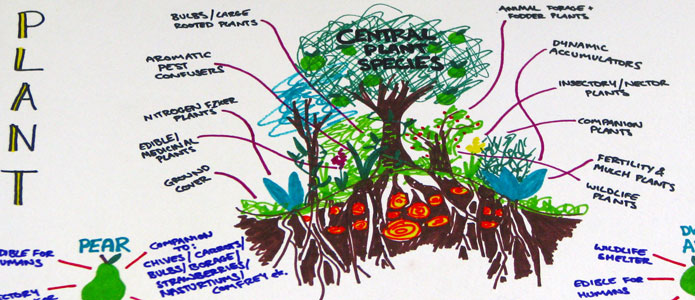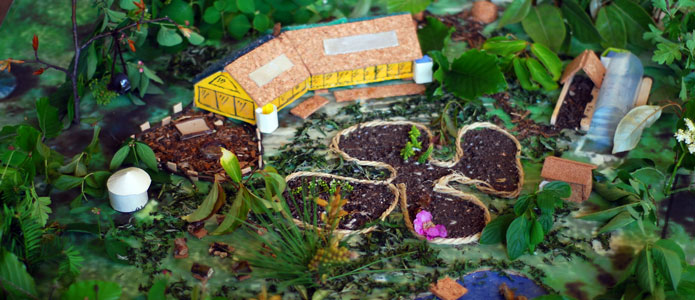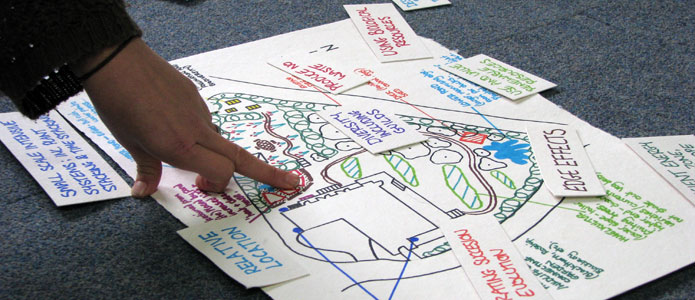Building sustainable communities
Saturday 1 November 2025 – Sunday 15 March 2026
14 weekend sessions and home study.
This course looks at how we can design resilient, abundant human ‘ecosystems’; working collaboratively with one another to care for the planet, each other and ourselves.
Course details
This course builds on our Introduction to permaculture course, giving you the skills to get started in permaculture design. It is certified by the Permaculture Association of Britain.
Permaculture gives you design tools for planning and implementing garden, home, work and community projects that look after the earth and people.
Our Permaculture design course (Building sustainable communities) is an interactive and practical course including sessions on:
- Ethics and principles of permaculture
- Design process and methodology
- Soil management and conservation
- Trees and woodland management
- Cultivated ecology: gardens and farms
- Effective group work and community living
- Real wealth, money and sustainable exchange
- Urban challenges and urban permaculture
- Energy conservation and renewable energy
Course schedule
The course will run from 10am to 5pm on the following days:
Saturday 1 November 2025, Brighton
Saturday 8 November 2025, Brighton
Saturday 15 November 2025, Brighton
Sunday 23 November 2025 , Brighton
Saturday 13 December 2025, Brighton
Saturday 10 January 2026, Brighton
Saturday 24 January 2026, Brighton
Saturday 14 February 2026, Brighton
Saturday 21 February 2026, Brighton
Saturday 14 March 2026, Brighton
Sunday 15 March 2026, Brighton
A further in person day tbc nearer the time, Prickly Nut Wood, Lodsworth, West Sussex
There will also be two tutorial sessions on Zoom:
Tutorial 1: Saturday 6 December 2025, 10am – 1.30pm
Tutorial 2: Saturday 31 January 2026, 10am – 1.30pm
How much time will the course take?
In addition to the scheduled sessions you will need to allow:
- Up to 90 minutes to complete activities at home in the week leading up to each session
- At least twelve hours on your design project, and you may choose to spend much longer on it. It can be done alongside the course but most people do a significant amount towards the end of the course
You receive learning materials and activities to complete in your own time at the beginning of the week before each course day. The sessions with tutors review and build on the learning materials. These sessions are interactive including time for questions about the learning done before the session, discussions and design activities in small groups.
Learning methods
On this course we create a participatory and diverse learning environment. The emphasis is on ‘action learning’, learning by doing and reflecting on our activities. We will be working individually, in small and large groups, engaging in talks with experts and doing our own practice designs.
A key part of the course is an extended design project of your choice. This is an opportunity for you to apply permaculture to a small scale practice design project and gain skills in using the design tools you have learned throughout the course. We integrate sessions on this during the course, providing support and feedback, both in groups and individually. The design project is a requirement for successful completion of the course.
Entrance requirements
Prior to attending our Permaculture design course (Building sustainable communities), you’ll need to have completed an Introduction to permaculture course, either Brighton Permaculture Trust’s Introduction to Permaculture course or an equivalent course elsewhere. Please do not reserve a place unless you have attended or have booked a place on an Introduction to permaculture course that runs before the start of the course.
Who is the course for?
The course is for anyone who is concerned with the environmental and social challenges around them and wants to develop positive solutions. Whereas some permaculture courses are intensive, this one is spread over several months to enable people to integrate permaculture design into many areas of their lives, including food growing, home renovation and livelihoods.
This is valuable for anyone wishing to add a permaculture perspective to their existing skills, and to community workers, teachers, architects, planners, landscapers, foresters, food growers, gardeners, designers, agriculturists and conservationists.
Our courses are open to anyone aged 16 or over.
Accreditation
The course is accredited by the Permaculture Association of Britain.
To be awarded the certificate, you must attend at least 10 days of the course and complete the design project, including attending the final two days of the course.
Please don’t register if you cannot meet these requirements.
What can the Permaculture design course lead on to?
Once you’ve gained the Permaculture Design Certificate you’ll be able to start using permaculture design in your life and work. You will be invited to join Brighton Permaculture Trust’s network of volunteers and encouraged to get involved in Brighton Permaculture Trust activities and those of other related networks. Students often start their own projects and invite each other to get involved in those. To further your learning or professional development you could go on to work towards a Diploma in Permaculture Design, a largely self-directed action learning process of at least two years.
You could also choose to become an apprentice permaculture teacher, or to take any of the wide range of more specialist permaculture courses now being offered throughout the UK and beyond for people with a Permaculture Design Certificate.
Course tutors and speakers
Tutors and speakers will include:
Stephan Gehrels, Dip Perm Des. Permaculture tutor and designer specialising in school and community growing projects
Fran Pickering has been with Brighton Permaculture Trust since 2003, received her Permaculture Diploma in 2009
Dr Alex Penn is an evolutionary ecologist and complexity scientist specialising in integrating scientific and permaculture thinking.
Lex Titterington is an artivist, land worker and creative facilitator.
Ben Law is a woodsman, green wood builder, teacher and author with a Dip Perm Des.
Mischa Hewitt, Eco buildings courses tutor, director of Low Carbon Trust, project manager Earthship Brighton project and sustainability consultant.
Fees
Fees include tuition, certification and refreshments.
- £895 – Sponsored/organisation rate
- £895 – Individual income more than 25k/yr
- £745 – Individual income 18-25k/yr
- £595 – Individual income less than 18k/yr
- £356 – Individual, concessionary rate (only 6 places available: check your eligibility)*
* Concessionary places are limited. If places are not available check back two weeks before the course/event as more may be available then.
We endeavour to make our courses and events affordable to all. Unfortunately, we do not receive any external funding for most of these and rely on large amounts of voluntary input.
See the cancellations and refunds policy.
Booking the Permaculture design course
If you have completed the booking process but you haven’t received a confirmation email from us please contact us to check your booking has gone through.
If you are booking within two weeks of the event, or the event is nearly full, you will not have the option to pay by cheque or BACS. Instead, you will need to pay immediately using a credit/debit card or PayPal.
IMPORTANT: Please state where and when you did an Introduction to permaculture course on the booking form. We need this information, so please make sure you include it.
IMPORTANT: Payment for the course can be made in full, or a place can be secured by paying a 50% deposit. If a deposit is paid, the remainder is due by Friday 10 October 2025.
Book the Nov-Mar PDC


